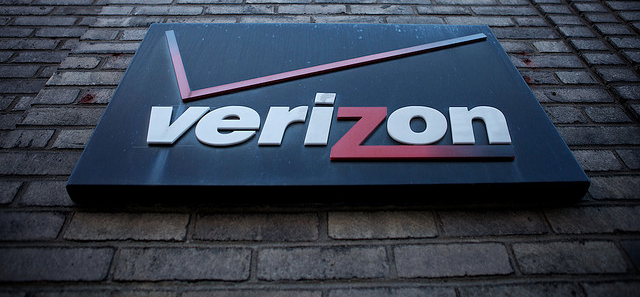Verizon Brings Fake Grassroots Campaign To New Jersey To Claim Support For Not Bringing Real Broadband
Verizon’s been taking that last option, as Ars Technica reports. There’s a legal process underway between the state and Verizon, and Verizon has mobilized an army of largely imaginary concerned citizens on their behalf to support their case.
In order for this to make any sense, let’s take a quick trip to the department of backstory.
The original agreement, part of the “Opportunity New Jersey” plan, dates to 1993. At that very early time, telephone operator New Jersey Bell made an agreement with the state of New Jersey (PDF) that included a provision for getting broadband digital service to 100% of the state by the year 2010. The agreement defined broadband as:
[S]witching technologies matched with transmission capabilities support data rates up to 45,000,000 bits per second [45 Mbps] and higher, which enables services, for example, that will allow residential and business customers to receive high definition video and to send and receive interactive (i.e. two way) video signals
That agreement was extremely foresightful, considering that in 1993 the few households regularly getting online at all were using incredibly slow dial-up modems and mostly connecting to services like AOL, CompuServe, and Prodigy. (On our CRT screens! Uphill in a blizzard!) But what neither NJ Bell nor the state foresaw at the time was the re-consolidation of the phone companies, and many of the little Bells eventually joining back up and becoming Verizon.
Verizon did not meet that 100% coverage goal by 2010. Nor did they meet it in any of the four years since. It’s not surprising that they fell short, given that they are both trying to kill off their old copper land lines and slowing, or even halting, their FiOS expansion. That combination doesn’t leave a whole lot of room in the strategic plan for “run more wires through New Jersey.”
New Jersey is understandably not pleased with Verizon’s lack of follow-through, particularly as the company has received twenty years’ worth of concessions from the state in order to make it happen. If Verizon has only reached two million of New Jersey’s three million households in twenty years, then those tax breaks and increased customer rates aren’t getting NJ what they were supposed to.
NJ’s utilities board required Verizon to explain why they haven’t met the terms of the roll-out, which kicked off a legal process in which Verizon has said that they shouldn’t have to anymore because it’s complicated and expensive. Plus, they say, competition now exists and anyway they can totally make good on the remainder with wireless 4G service.
Now we’re back to the present day, where the legal back-and-forth between Verizon and New Jersey hit the public comment stage last month. In order to bolster their claims, Verizon went and found a whole lot of public to make comments in their favor. 418 identical pro-Verizon e-mails were sent to the utility board between March 22 and March 24, and 315 copies of a second form e-mail claiming to be from Verizon employees were sent on March 19 and 20.
In total, Ars reports, at least 792 form comments were submitted on Verizon’s behalf in the span of a couple weeks. And while that would be one thing if Verizon really did get happy customers or gung-ho employees to send the letters… it seems they didn’t.
Ars Technica picked some e-mail addresses from the list to spot-check against. Some were invalid and received bounce-backs. One was a Verizon customer who was shocked to find that “he” had sent the message at all:
“I am a customer only to Verizon and I was not contacted by them to submit anything,” the person told Ars. “If they did, I would’ve slammed them. They are gougers. If AT&T was where I lived, I would switch in a heart beat.”
When this customer was shown the e-mail he allegedly sent to state officials, he said, “That would mean someone did it on my behalf. I can assure you that I did not send that response.”
Broadband news site Stop The Cap also tried to contact the supposed Verizon supporters and found much the same problem. Of the 150 e-mail addresses they tried, 35 were invalid. So they contacted another 35, and a dozen of those were also invalid. Of the remainder, many were Verizon employees or retired Verizon employees. One was a lawyer who represents Verizon (and did not disclose it). Five had “no idea what we were talking about” and claimed they never sent any e-mails either for or against Verizon.
Ars’s report includes a good technical discussion of what’s at stake for New Jersey residents now. Whether or not Verizon will be obliged to run more wires through the Garden State is up in the air, but what isn’t is the fact that broadband access has gotten more important than ever. The digital divide is real, and even Comcast admits that expanding access is a necessity.
Creating a broadband plan in 1993 was remarkably ahead of its time. But faking grassroots support in order to pretend it’s not needed anymore? That’s a great way for Verizon to set the state back.
Verizon led massive astroturf campaign to end NJ broadband obligation [Ars Technica]
Verizon’s Curious Allies, Employees Urge N.J. Regulators to Forget About FiOS Fiber Expansion [Stop The Cap]
Want more consumer news? Visit our parent organization, Consumer Reports, for the latest on scams, recalls, and other consumer issues.


